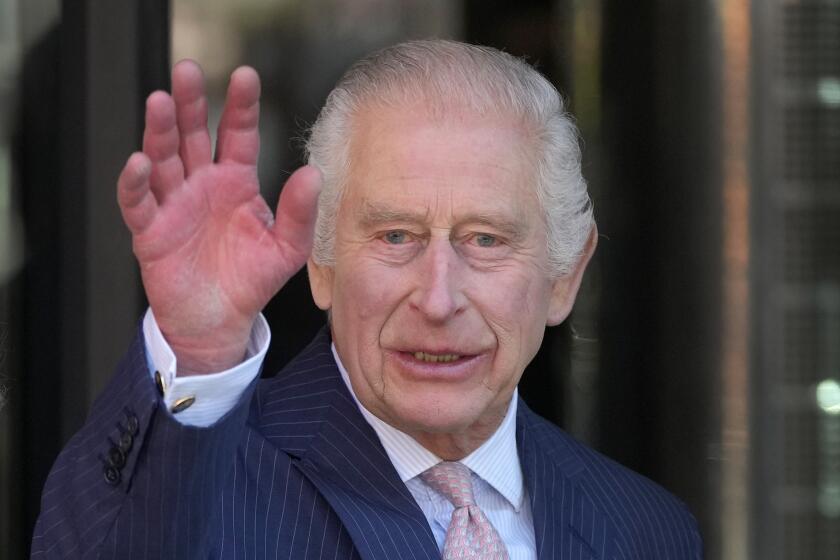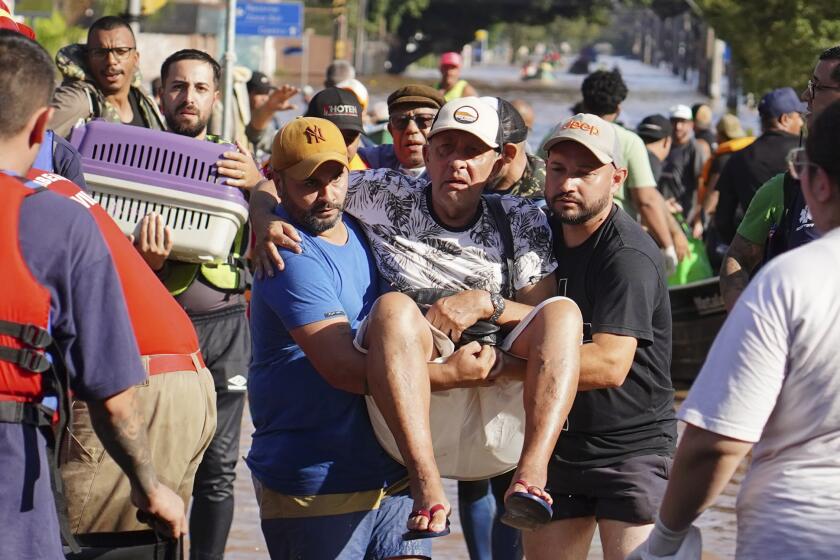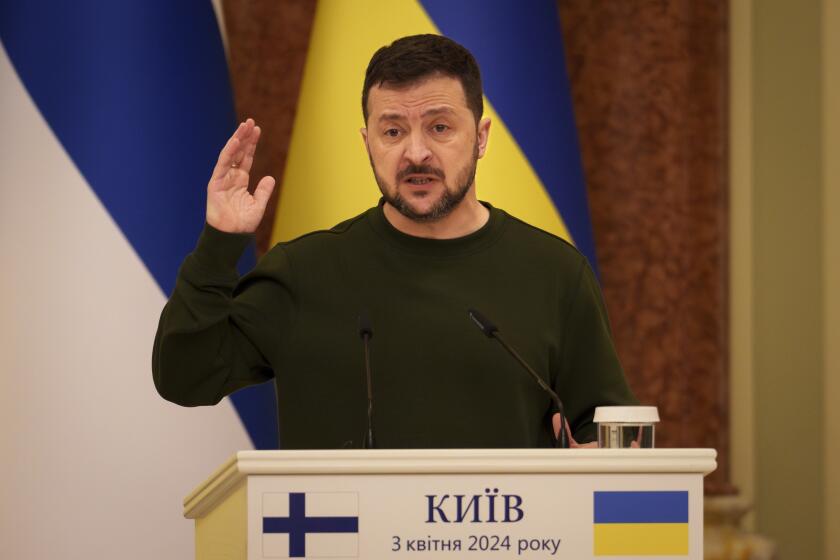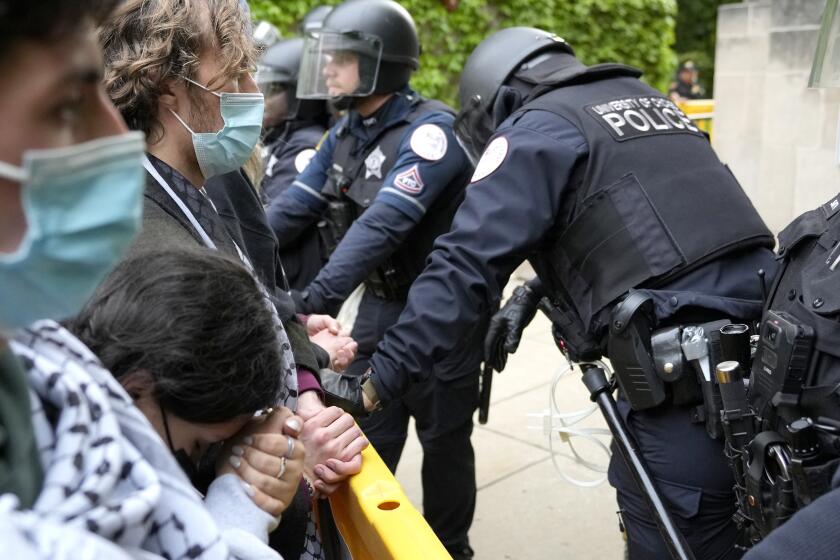Bush Sees Colombian Crisis as Best Chance to Stem Cocaine Tide
President Bush and his senior advisers consider the situation in Colombia “the best hope we’ve had” for stemming the tide of cocaine flowing to the United States from Central America.
“What we have here is a crisis precipitated by the most brazen kind of terrorist activity and not to really seize the opportunity to do something about it would be crazy,” one senior official said.
It is not clear, however, whether the $65-million emergency aid package Bush announced Friday--essentially an accelerated version of what he already had planned to unveil in a long-scheduled drug speech on Sept. 5--will be enough to defeat the well-equipped and -financed international drug cartels based in Colombia.
A host of factors, including the sensitivity of Latin American nations to U.S. intervention and the longstanding reluctance of the Pentagon to plunge into the war on drugs, have led the Administration to stop short of an all-out effort, in the view of some outside experts.
‘The Best Hope’
And specialists both inside the government and out agree that the present “window of opportunity” may not remain open long. Expressing concern that Colombian leaders may waver in the face of the cartels’ violent attacks, one senior Bush adviser said, “I hope they won’t bend, because if they can sustain their current campaign against the cartels it’s the best hope we’ve had” to bring the cocaine traffic under control.
U.S. intelligence sources said that among leading political figures in Colombia there already has been talk that the government may eventually have to relax its crackdown and seek a negotiated compromise with the cartels if it cannot defeat them quickly and stop the wave of violence.
The Administration’s aid package does represent a substantial increase from the current aid level of $29.6 million a year, which is itself almost twice as large as the $15 million in assistance Washington provided to Colombia the previous year. And the bulk of the new equipment in Bush’s plan will be delivered quickly, beginning within a few days.
Ann B. Wrobleski, former assistant secretary of state for international narcotics matters, said the equipment pledged by the Administration fills significant gaps in the arsenal available to the Colombian government to battle the cocaine cartel.
A ‘Fairer’ Fight
“The Colombian security forces are among the best-equipped and best-led in Latin America to go up against the narcos, but they have been short on the kind of heavy equipment and the kind of firepower the President is giving them,” she said. “It’s got to make the fight a little fairer.”
At the same time, the aid package appears to stop short of the maximum effort the United States could make to underwrite an all-out assault on the cartels, especially an assault that struck all of their operations together.
The military hardware the Administration will send to Colombia was drawn from a list of available equipment provided the White House on Thursday by the Joint Chiefs of Staff.
The Pentagon, reflecting its longstanding ambivalence about involving military forces in the anti-drug effort, pointedly made no recommendations about which parts of the hardware would make the most effective tools in the drug fight.
“The first premise was that all of this stuff was going to be operated by indigenous forces,” said a senior defense official, referring to the Colombian military. “We’re helping. We’re not going to do their work for them.”
An active-duty U.S. Army colonel, who served as a defense attache in Latin America in the early 1980s, said that the Joint Chiefs’ approach to the Colombia crisis was marked by “half-measures that won’t work.”
‘Very Unimaginative’
“They’re trying to have a risk-free operation, but there’s no such animal,” he said.
And a recently retired Army specialist in counterterrorism and special operations called the Bush aid package “a very unimaginative approach.” He suggested committing the Pentagon’s most sophisticated intelligence-gathering gear, from AWACS surveillance planes to electronic eavesdroping ships, in order to have up-to-the-minute information on activities of the drug operations.
He said, however, that a more effective response would almost certainly have to include U.S. forces in order to attack enough targets to cripple the drug barons.
Colombian President Virgilio Barco Vargas already has ruled out accepting the support of U.S. troops, which Atty. Gen. Dick Thornburgh recently said the Administration would consider if requested by Colombian authorities.
Barco, interviewed on ABC’s “Prime Time Live” program Thursday night, said that Colombia needs more equipment to fight the cartels because more than 80% of the cocaine seized globally is taken in his country, and Colombia “is the most effective place to stop the supply of cocaine.”
On the same program, Ernesto Samper, who has replaced the assassinated Luis Carlos Galan as a leading Liberal Party presidential candidate, raised the possibility that Colombian authorities may consider negotiating with the cartels as an alternative to miliary confrontation.
Little Leeway Seen
“We have only three months, no more than three months, to stop the traffickers,” Samper said. “If we can, we must find another way.” And negotiations, he said, is “one of the ways.”
But a senior U.S. intelligence official, pointing out that negotiations between Colombian authorities and the cartels in the past had been to no avail, said the United States must press Colombia to keep the pressure on the cartels.
“This is one democracy that is really trying to do something about the drug problem, and we can’t let them down,” he said. “And I don’t think we will.”
One encouraging sign, said the official, is that the government’s sweeping crackdown in the wake of Galan’s death apparently took the cartels by complete surprise. He said that indicates that the cartels’ influence in the government, generally secured through bribes and intimidation, had waned and that officials had been able to develop and implement a contingency plan of action against the cartels without their advance knowledge.
Privately and publicly, Administration officials have emphasized that they believe the crackdown Barco authorized is the most effective ever mounted against the cartels.
Times staff writers John M. Broder and Norman Kempster contributed to this story.
More to Read
Start your day right
Sign up for Essential California for news, features and recommendations from the L.A. Times and beyond in your inbox six days a week.
You may occasionally receive promotional content from the Los Angeles Times.






